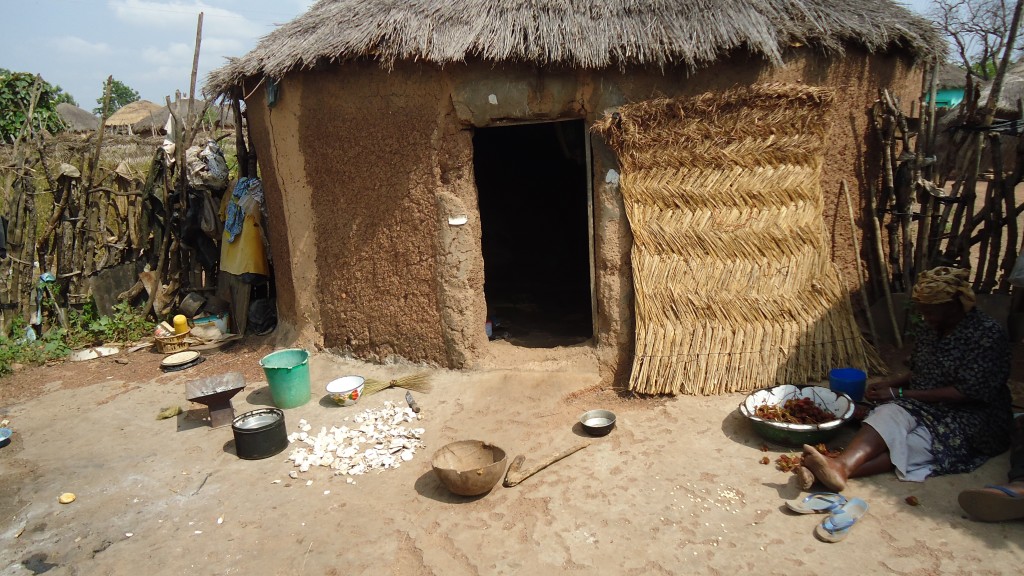Kukuo: Inside a ‘Witch Camp’ in Ghana
Kukuo is a small community located off Bimbilla, near Oti river in the Northern Region of Ghana. It is one of those communities where banished ‘witches’ take refuge. In December, I visited Kukuo village as part of a pilot study. Like other villages in Northern Ghana, Kukuo has a chief, but currently the chief is dead and a regent is overseeing the affairs of the village till a new chief is appointed. There is also a traditional priest. One of the duties of the priest is to carry out a ritual of ‘purification’ on any alleged witch that arrives in the village before the person is allowed to live in the community.
Kukuo hosts one of Ghana’s ‘witch camps’, but I didn’t notice any restricted and exclusive area for alleged witches in this village. Instead I found Kukuo to be a community that welcomes ‘strangers’and provides a safety net for ‘old ladies’ as alleged witches are often called. I saw a community that gives alleged witches an alternative home and some hope in a country where anyone accused of witchcraft has two options – to flee to any of the witch camps or be killed.
In Kukuo, the women mixed freely with other members of the community without fear, discrimination or stigma.
No one knows exactly when the first ‘old lady’ arrived Kukuo, but from what I gathered from the community members, that was so many years ago. In fact I met some ‘old ladies’ in their 90s who came to Kukuo as teenagers to cater for their mothers who were banished for witchcraft. They stayed back after the death of their mothers and have adopted Kukuo as their home. Currently, there are 113 alleged witches living in Kukuo. Many of them came to this remote village by foot.
Many of the alleged witches said they would like to return to their original homes but were afraid for their lives. Some did not want to go back at all. They felt safe and at peace in Kukuo.
But that is because they do not have a better alternative. In Kukuo, life is hard. Survival is difficult. Most of the women survive by farming for others, but many of them are getting too old and could not farm any longer. Some of them were sick. One of the women could not walk, and she was living alone. She crawled around to cook and to attend to her daily chores. Some have resorted to begging for survival.
There is a scarcity of water in Kukuo. The only water pump installed in the village dries up during dry season, and the river is around 2 kilometers away. Many of the women cannot descend the hill to fetch water from the river. The situation is worse for the women who are childless or those who have no children staying with them.
Nevertheless ‘old ladies’ fleeing their communities after being accused of witchcraft are still coming to Kukuo to seek refuge. I met a 48 year old woman, Fusa, who came to Kukuo in November. Her husband died many years ago and she went to live with the mother.
In November, a neighbour’s child took ill and she was accused of being responsible. A man in the family who owed her some bags of groundnuts was her main accuser. Fusa was taken to the chief’s palace and there a local mob threatened to kill her if she did not heal the sick child. She denied being responsible for the child’s illness. The situation got so tense that one of her relations living in a nearby town had to send a police team to rescue her. She was later taken to Kukuo where she is currently staying. Fusa was heart broken and traumatized. Fusa just finished building a house and was about to move into it before she was accused and driven out of the village. Apparently the witchcraft accusation served as a pretence to dispossess her of the house. Other alleged witches I met in Kukuo had similar stories of making somebody sick, causing the death of a family or community member, or being seen in a dream.
Until something is done to address the root causes of witchcraft accusation, Kukuo remains one of the destinations for alleged witches who want to remain alive.
About the Author
Nothing


Something has to be done about superstitious belief in witches. Witchcraft accusations create so much suffering for their victims, such as ostracization and even violence. This is no way for a 21st century society to treat its members.
[…] Speaking of children being seen as “witches,” and witch hunts, and cruelty to putative witches, don’t miss Leo Igwe’s new article, Kukuo: Inside a ‘Witch Camp’ in Ghana. […]
[…] access to education, healthcare, and business opportunities for women in Accra. Then we visited the Kukuo camp for alleged witches in Northern Ghana. Right now, we are building latrines with Children of the Border in La […]
Please, I would like to seek permission from Mr. Leo Igwe to publish this article in my booklet about superstitions.
Thanks Leo for this factual write up. I am a native of Kukuo I know the hardships the old women go through especially the difficulties of getting drinking water. Since your visit, two boreholes have been drilled. Their location is also about 2 miles but unlike the river, there is no high hill between the borehole and the village. I’ll be glad to engage with any individual or organizations on addressing the problems of these old women.
Email: amharunat@yahoo.co.uk